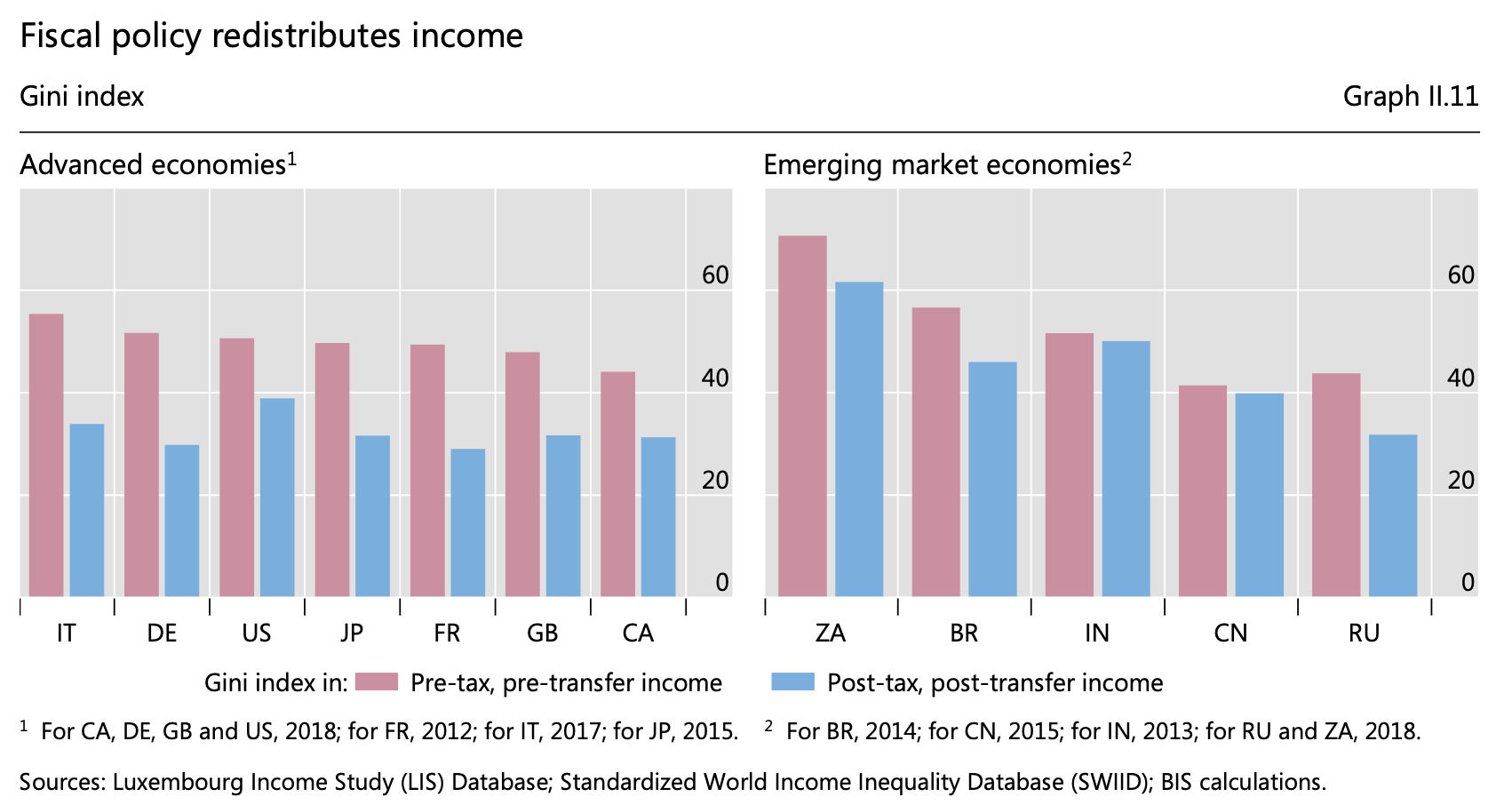Geldpolitik und Ungleichheit – sind die Notenbanken wirklich unschuldig?
Gestern habe ich an dieser Stelle den aktuellen Bericht der BIZ zitiert und mich auf den Teil beschränkt, der mit den langfristigen Gefahren der aktuellen Politik umgeht.
Im zweiten Teil des Berichts geht es um die Frage, ob die Notenbanken eine (Mit-)Schuld an der zunehmenden Ungleichheit tragen. Das Fazit der BIZ war eher “Nein”. Martin Wolf von der FINANCIAL TIMES (FT) hat sich diesen Teil des Berichts vorgenommen und schreibt:
- “(…) since (…) the ‘Great Financial Crisis’, the proportion of speeches by central bankers mentioning inequality has soared. This partly reflects rising political concern about inequality. But it also reflects a specific critique. This is, in the report’s words, that ‘central banks have deployed policies featuring exceptionally low interest rates and extensive use of balance sheets to support economic activity and lower unemployment. Such measures have fuelled concerns that central banks’ actions, by boosting asset prices, have benefited mostly the rich’.” – bto: Und ich finde, dieses Argument ist nicht so ganz von der Hand zu weisen.
- “Yet there is also an opposite critique from people who upbraid central banks for not being activist enough. People in this camp argue that the failure has been to be too passive, letting inflation remain too low and labour markets stay too weak. At present, central banks, even the European Central Bank, are far closer to this position (…).” – bto: Klar, rechtfertigt es doch ihr Handeln.
- “The view of the BIS itself is threefold. First, the rise in inequality since 1980 is ’largely due to structural factors, well outside the reach of monetary policy, and is best addressed by fiscal and structural policies’. Second, by fulfilling their monetary mandates, central banks can reduce the impact of shorter-term shocks to economic welfare caused by inflation, financial crises and, no doubt, real shocks (such as pandemics). Finally, central banks can also do something about inequality with good prudential regulation, promoting financial development and inclusion and ensuring safe and effective payments.” – bto: Das mit den strukturellen Faktoren – Demografie, Globalisierung – stimmt, ist aber keine Begründung für den Anteil, den die Notenbanken daran haben.
- “It is clear (…) that falling real interest rates and easy monetary policies have tended to raise asset prices, to the benefit of the wealthiest. But, interestingly, the measured impact on wealth inequality has not been as dramatic as one might have expected. More important, it would have made no sense to adopt a deliberately more restrictive monetary policy solely in order to lower asset prices. This would have reduced activity and raised unemployment. (…) Meanwhile, how would the majority of people, who own almost no assets, be better off because billionaires were a bit poorer? It would be mad for central banks to cause slumps in order to lower asset prices.” – bto: Vor allem, weil diese als Sicherheit dienen und damit als Anker des Weltfinanzsystems, ist es brandgefährlich, sie fallenzulassen. Was das Problem auf den Punkt bringt.
- “A more relevant concern is raised by the dominant contemporary demand to ‘run the economy hot’. That raises two real (and possibly related) dangers: inflation and financial instability. On the former, proponents of this approach argue that one cannot know where the risk of significant inflation lies without pushing the economy not just to, but beyond, the limit. But that could also prove costly if, as some fear, inflation soars and that overshoot proves very expensive to reverse.” – bto: Ich denke, hier herrscht ein breiter Konsens, dass es versucht werden wird, koste es, was es wolle.
- “There is simply so much debt. That may be fine if interest rates stay low. But will they?” – bto: Die Notenbanken werden alles dafür tun …
- “Where the BIS is clearly correct is that fiscal and structural policies are the main way to address inequality. Indeed, some high-income countries are quite effective in using the former in this way. The big contrast between the US and other high-income countries in income inequality, for example, is in the relative absence of redistribution in the former.” – bto: Und wo schreit man am lautesten? Genau, bei dem Land, das schon am meisten macht:

Quelle: BIZ
- “Structural policy is a still more complex issue. Too often, this is just a synonym for market liberalisation. But financial liberalisation has surely increased inequality and financial instability. So, good structural reform would almost certainly seek to constrain finance. Similarly, in labour markets with significant monopsonies, labour market deregulation might well be bad for employment and inequality. Moreover, rising inequality is almost certainly a factor in creating the structurally weak demand that explains the declining real interest rates and soaring indebtedness characteristic of our era of ‘secular stagnation’. For all these reasons, the structural reforms we should be thinking about are more difficult than conventional wisdom imagines.” – bto: Das mag sein. Was bei uns zu tun ist, dürfte allerdings weitgehend offensichtlich sein.
- “(…) given our chronic reliance on expansionary monetary policy (…) financial excess is sure to re-emerge, making regulation an unending game of ‘whack a mole’. The BIS is correct to call for radical structural reforms. But they have to be the right kind of structural reforms.” – bto: Und es müssen die richtigen Politiker sein, die die strukturellen Reformen durchführen. In Deutschland sehe ich die nicht.
→ ft.com (Anmeldung erforderlich): „Monetary policy is not the solution to inequality“, 29. Juni 2021







